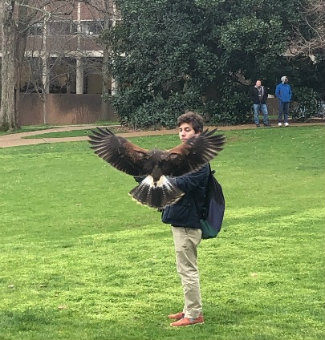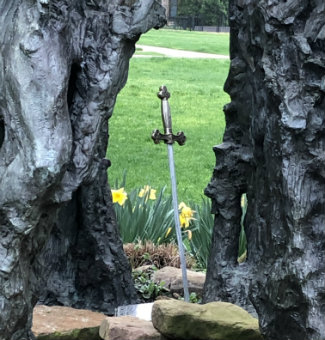
Students in “King Arthur and the Literature of Chivalry,” a first-year writing seminar taught by University Librarian and Professor of English Valerie Hotchkiss, devoted recent class time to what 21st-century chivalry looks like, especially during the coronavirus outbreak.
In the seminar, offered for the first time this spring, students reviewed ancient chronicles for evidence of a historical Arthur. They read numerous medieval tales of Arthur and his knights from German, French and English literature and examined medieval handbooks of chivalric codes. In late February, they even experienced medieval falconry when Tennessee falconer David Hudson brought hawks and falcons to Library Lawn.
Students also explored the afterlives of King Arthur in the 20th century, including Winston Churchill’s use of the Arthurian legend during the Battle for Britain and the origins of the myth of Camelot to describe the presidency of John F. Kennedy.
During the later sessions, which occurred online following the university’s shift to online and alternative education for the remainder of the semester, students considered the place of chivalry in the 21st century. They replaced the planned on-campus assignment to test the question “Is chivalry dead?” with discussions of the place of chivalry in the challenging and stressful times of the coronavirus pandemic.

“With their deeper understanding of the behavioral codes encompassed by the term ‘chivalry’ in the Middle Ages, the students looked to current events for examples of chivalrous virtues and found them in everything from New York Gov. Andrew Coumo’s eloquence to the courage of health care workers to the common courtesies of wearing a mask and maintaining social distance,” Hotchkiss said.
“Chivalry today is all about being respectful and mindful of the people around us,” said Ria Jindal, a first-year student. “By staying home, following the rules of social distancing and showing empathy for others, we can definitely all be chivalrous.”
While several students said they had always thought of modern chivalry as simple acts of kindness, such as opening doors for others or letting another driver merge into heavy traffic, the course gave them an expanded perspective on chivalry. The coronavirus outbreak caused them to consider how chivalry plays out in the new normal.
“There’s definitely more to chivalry today than just opening doors for people,” said Richard Johnston. “Being grateful and generous toward others, speaking well, exuding kindness and having reverence for God and others will continue to be relevant and important in society.”
Max Beck spoke of the courage of elected officials who are caring for their communities and leading with courage. “Those are the chief responsibilities of any chivalric knight, king or queen in the literature we’ve read,” he said, “and we are seeing mayors and governors and university administrators showing the same kinds of leadership skills.”
Fernando Mendez said that he viewed the essential workers, those who are working on the front lines every day and “risking their lives to help others during the pandemic,” as today’s knights of the roundtable.
Classmate Tom Ellis agreed, noting that “personal integrity is essential to living out the chivalric code. We have seen this in the medieval literature we read, and it is relevant today. By staying true to ourselves, upholding our duties and helping other people, each one of us can embody chivalric values in the 21st century.”

While students in “King Arthur and the Literature of Chivalry” have been meeting virtually for several weeks, Hotchkiss recently came across a mysterious object on Library Lawn she thinks was placed by one or more students. Amidst the daffodils surrounding the Greg Wyatt sculpture of “The Tree of Learning” in front of Central Library is a replica of Excalibur, the legendary sword of King Arthur, which was believed to have magical powers, in a stone.
“No one has admitted to doing this, but I know that students of chivalry tend to be rather discreet,” Hotchkiss said.
Are any of them bold enough to try to pull the sword from the stone when they return to campus? “Maybe the student with the highest grade in the seminar can do it,” said first-year student Rohit Khurana.